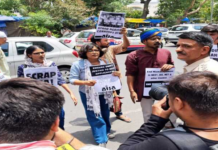The Olympic movement claims political neutrality-
In reality, that ideal is often selectively applied. The inference here is that the Olympics, with a rule-based platform for nations and athletes to come together respectfully and cohesively, provide an opportunity for dialogue and friendship that resonates beyond sport.
The confluence of nations at the Olympics also underscores the IOC’s much-vaunted position that the games must be politically neutral. Indeed, as a practical demonstration of that aspiration, both the IOC and the United Nations promulgate the goal of an Olympic Truce for a period of seven days before the Olympics until seven days after the Paralympics.
Thus, there is an expectation that UN member states will “cease hostilities”, ostensibly to protect athletes competing at the Tokyo games.
However, that anti-political idealism is confounded by a sobering reality: nations and athletes come together to compete at the Olympics, but they can hardly leave behind a range of tensions and conflicts in global geopolitics.
Indeed, beneath the hubris of Olympic evangelism, the realpolitik of corruption, conflict, domination or genocide permeate numerous countries that are an integral part of the so-called “Olympic family”. Among them, Myanmar and Iran provide compelling examples.
Myanmar
The Facebook site of the Myanmar Olympic Committee highlights an invitation to athletes at Tokyo to sign the Olympic Truce Mural. However, this hardly seems a straightforward matter for the three qualified athletes from Myanmar.
Back home, the country’s military dictatorship has shown genocidal intent against the (largely) Muslim Rohingya community, while Myanmar’s armed forces, reacting against pro-democracy activists, have reportedly “killed more than 900 people since the coup and detained thousands”.
The IOC, meanwhile, will welcome to Tokyo 2021 Myanmar’s deputy minister for health and sports, U Myo Hlaing, thereby providing sanction to the country’s repressive regime. For Win Htet Oo, an expatriate swimmer living in Melbourne with his family from Myanmar, the hypocrisy of representing a country that is wantonly killing its own people proved too much to bear. Win Htet initially wrote to the IOC with a request that he be allowed to swim as a “neutral athlete”, independent of any country.
But this was denied, presumably because he was not a refugee. The “politically neutral” IOC was not about to allow a citizen-athlete to claim neutrality from their country. Unable to disassociate himself from a murderous regime, Win Htet withdrew from selection for the Tokyo games, declaring: “I shall not march in the parade of nations under a flag steeped in my people’s blood.”By contrast, Thet Htar Thuzar, a badminton player, is committed to representing Myanmar at the Tokyo Olympics. In a social media post, she wrote that her “long-cherished dream has come true”. Thet Htar was not merely self-absorbed: she hoped to “make her compatriots smile even for just a moment amid the hardships they are facing”.
However, many respondents on social media were unimpressed, seeing “participation in the games by local athletes as a gesture of subservience to the Myanmar military”.
Unlike Win Htet, though, Thet Htar and her family live in Myanmar under a dictatorship. With the military regime talking up her role in the Olympics, she may have been in no position to talk it down.
Iran
Wrestling is a sport in which Iranians have performed extremely well. The country’s official news agency reports that six wrestlers will represent the republic at Tokyo 2021.
However, champion Greco-Roman wrestler Navid Afkari cannot be among them. In September 2020, he was executed by the Iranian government. The execution was widely seen by critics as retribution for Navid’s high-profile participation in mass protests against an oppressively authoritarian regime.
The IOC was deeply disappointed that its diplomatic representations to the Iranian government, seeking clemency for Navid, were ignored. Capital punishment is, of course, part of state power in many countries that take part in the Olympics. But critics contended that Navid’s trial was a sham. For them, this punishment amounted to a political execution.
– Dhairya Mahadev


















